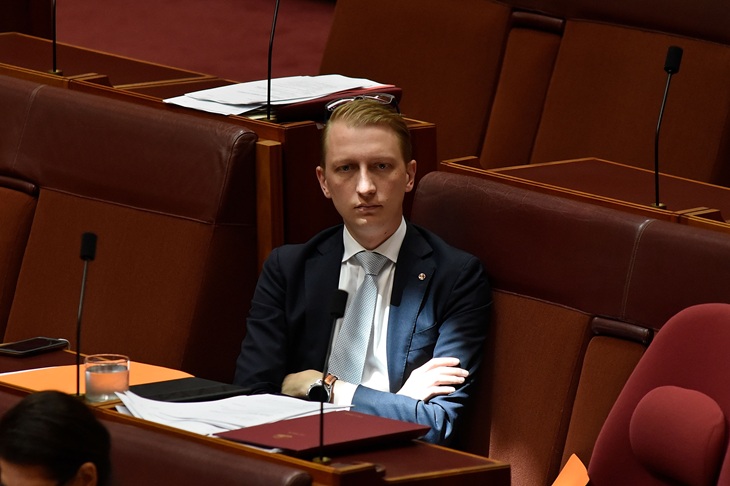
CANBERRA, AUSTRALIA - NOVEMBER 28: Senator James Paterson listens to Senator George Brandis as contemplates the bill legalising same-sex marriage in Australia at Parliament House on November 28, 2017 in Canberra, Australia. The Senate is hoping to pass legislation on same-sex marriage this week, after Australians voted 'Yes' in the Marriage Law Postal Survey for the law to be changed. (Photo by Michael Masters/Getty Images)
URGENT UPDATE: Senator James Paterson has delivered a powerful speech urging the Liberal Party to abandon its “apology tour” and refocus on core conservative values. Speaking at a crucial moment for the party, Paterson warned that failure to adapt could lead to political irrelevance in a rapidly changing landscape.
The address, made earlier today, resonates with Australians concerned about the increasing dominance of progressive ideologies and the erosion of traditional values. Paterson emphasized the need for the Liberal Party to stand firm against the Labor Party and its “culture wars,” which he claims threaten to undermine the very fabric of Australian society.
“We must not hollow ourselves out by accepting the left’s social agendas,” Paterson declared, urging party members to defend freedom, tradition, and patriotism with renewed vigor. His remarks come in the wake of recent electoral victories in the Northern Territory, Queensland, and Tasmania, indicating that liberal-conservative principles still resonate with voters.
As the political climate grows increasingly hostile, Paterson’s call to action highlights an urgent need for the Liberals to resolve internal divisions and present a united front. He warned that ongoing public infighting and ineffective opposition strategies could lead Australia towards a “Victorianisation” of entrenched left-wing dominance.
Paterson’s insights reflect a broader sentiment among party members who fear that appeasement strategies aimed at winning back moderate voters have alienated the party’s core base. “We cannot afford to chase economic centrism at the expense of our foundational beliefs,” he stated, emphasizing that family, faith, and national pride must be prioritized.
With the Labor government accused of wielding power irresponsibly and undermining democratic norms, the Liberals face a moral imperative to oppose effectively. “If we do not stand up now, we may find ourselves in a position where we can no longer defend our principles,” Paterson warned.
The stakes are high. The culture wars encompass critical issues such as identity politics and historical revisionism, shaping public education and societal norms in ways many Australians find concerning. Paterson labeled the ongoing ideological conflicts as fundamental to the future of Australia’s democracy.
“We need leaders who will unapologetically defend our nation’s heritage,” he declared. “The old strategies are failing us; we must adapt to the geopolitical realities of our time.”
As the Liberal Party grapples with its identity and future direction, Paterson’s speech serves as a rallying cry for those who believe in the necessity of a robust and unapologetic conservative response to current challenges.
The call to arms comes as the party faces mounting pressure to redefine its role in a landscape dominated by progressive narratives. “The broad church of the past is dead,” Paterson asserted, urging a reevaluation of the party’s approach to governance and societal issues.
The urgency of the moment cannot be overstated. As Australia stands at a crossroads, the implications of the Liberal Party’s choices will resonate for years to come. Paterson’s plea for a return to foundational principles and a cohesive strategy to combat leftist ideologies may very well determine the party’s survival in the face of mounting challenges.
What happens next is crucial. Will the Liberal Party heed Paterson’s call and redefine its strategy, or will it continue down the path of division and compromise? The eyes of a nation are watching, and the time for action is now.






